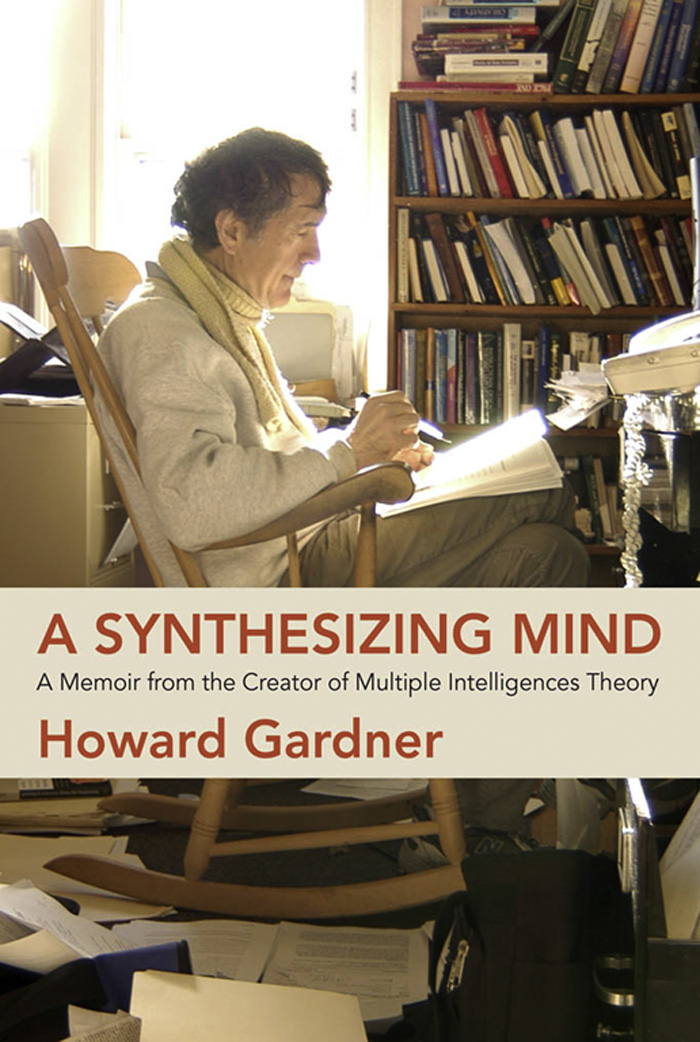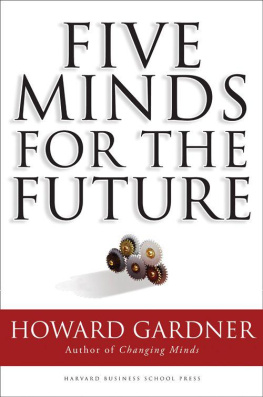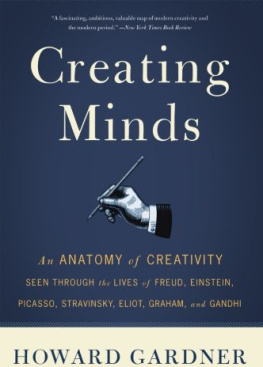Howard Gardner - A Synthesizing Mind: A Memoir from the Creator of Multiple Intelligences Theory
Here you can read online Howard Gardner - A Synthesizing Mind: A Memoir from the Creator of Multiple Intelligences Theory full text of the book (entire story) in english for free. Download pdf and epub, get meaning, cover and reviews about this ebook. year: 2020, publisher: MIT Press, genre: Home and family. Description of the work, (preface) as well as reviews are available. Best literature library LitArk.com created for fans of good reading and offers a wide selection of genres:
Romance novel
Science fiction
Adventure
Detective
Science
History
Home and family
Prose
Art
Politics
Computer
Non-fiction
Religion
Business
Children
Humor
Choose a favorite category and find really read worthwhile books. Enjoy immersion in the world of imagination, feel the emotions of the characters or learn something new for yourself, make an fascinating discovery.

- Book:A Synthesizing Mind: A Memoir from the Creator of Multiple Intelligences Theory
- Author:
- Publisher:MIT Press
- Genre:
- Year:2020
- Rating:3 / 5
- Favourites:Add to favourites
- Your mark:
- 60
- 1
- 2
- 3
- 4
- 5
A Synthesizing Mind: A Memoir from the Creator of Multiple Intelligences Theory: summary, description and annotation
We offer to read an annotation, description, summary or preface (depends on what the author of the book "A Synthesizing Mind: A Memoir from the Creator of Multiple Intelligences Theory" wrote himself). If you haven't found the necessary information about the book — write in the comments, we will try to find it.
A Synthesizing Mind: A Memoir from the Creator of Multiple Intelligences Theory — read online for free the complete book (whole text) full work
Below is the text of the book, divided by pages. System saving the place of the last page read, allows you to conveniently read the book "A Synthesizing Mind: A Memoir from the Creator of Multiple Intelligences Theory" online for free, without having to search again every time where you left off. Put a bookmark, and you can go to the page where you finished reading at any time.
Font size:
Interval:
Bookmark:

Howard Gardner
The MIT Press
Cambridge, Massachusetts
London, England
2020 Howard Gardner
All rights reserved. No part of this book may be reproduced in any form by any electronic or mechanical means (including photocopying, recording, or information storage and retrieval) without permission in writing from the publisher.
This book was set in Scala and ScalaSans by New Best-set Typesetters Ltd.
Library of Congress Cataloging-in-Publication Data
Names: Gardner, Howard, 1943 author.
Title: A synthesizing mind : a memoir from the creator of multiple intelligences theory / Howard Gardner.
Description: Cambridge, Massachusetts : The MIT Press, [2020] | Includes bibliographical references and index.
Identifiers: LCCN 2019055253 | ISBN 9780262044264 (hardcover)
Subjects: LCSH: Gardner, Howard, 1943 | PsychologistsBiography. | Multiple intelligences.
Classification: LCC BF109.G367 A3 2020 | DDC 150.92 [B]dc23
LC record available at https://lccn.loc.gov/2019055253
10 9 8 7 6 5 4 3 2 1
d_r0
To my mentors, who taught me so much
To my tor-mentors, who demonstrated what I should not do or be
To my students (and grand-students), who continue to teach me
To public radio, whose news and classical music have sustained me for decades
To my family, whose love has sustained me throughout my life
I knew things were different as soon as I walked into the room.
It was the fall of 1984, and Id been invited by the National Association of Independent Schools to speak at its annual conference. The venue was the Hilton Hotel in midtown Manhattan. I had been asked to speak about my recently published book, Frames of Mind: The Theory of Multiple Intelligences.
A researcher and occasional teacher in psychology, I was already an experienced lecturer. I had written many scholarly and popular articles, a number of books and textbooks, and had even won some awards. My new book had gotten considerable attention and I had already given a few talks on the topic, both before and after the books publication date in September 1983.
As I made my way down the hallway and into the lecture hall, I noted that the room was completely filled, even overflowing. And as soon as I walked in, the pre-lecture buzz abruptly ceased. In the suddenly hushed environment, I observed people gesturing toward me as the chatter gradually resumed at a much lower volume. When I was introduced, I was met by a round of applause, unusual in academic settings at that time. During the lecture, many in the audience seemed held in rapt attention, much more so than at standard conference talks where wandering to and fro and shuffling papers audibly are the norm. And after the talk, I was asked to sign a lot of books (this was decades before the advent of the selfie or the Kindle).
My intimation was correct. The publication of a book about the theory of multiple intelligences had changed my life forever. Before, I had been a research psychologist plying my trade; now, I was the author of a much-discussed treatise and the creator of a controversial theory. I had written several works of synthesis that were principally about other peoples ideas; now my own ideas had become the subject of praise, criticism, and debate. And while I preferred (and still prefer!) not to be recognized on the street or at the airport, I gradually got used to the idea of assenting when asked if I were, indeed, Howard Gardner, or Dr. Gardner, or Professor Gardner, or even the Howard Gardner.
In some ways, I found my notoriety as a scholar and budding public intellectual satisfying. Though I dont think I had dreamed before about being a minor celebritythats not my inclinationit is admittedly gratifying to be known, to be invited to interesting conferences and parties in evocative settings, and to increase ones nonsalaried income. In this book, I touch on some of these rewards.
However, my primary motives for writing a memoir are different, and twofold.
First, in our time, and especially in the United States, speakers and writers come to be associated with a particular idea. I have written thirty books and hundreds of articles, and have carried out dozens of research studies, but I am knownand concede that in all likelihood I will always be knownas the creator or father of multiple intelligences (MI). In no way do I renounce or regret having developed this theory. Indeed, I have spent some time working on it in the decades since I first introduced the ideas. Yet, by personality, temperament, and calling, I have never wanted to continue working only on MI ideas. I have in fact resented the contention that, just because I developed the theory, I am obligated to keep refining it and, even less alluringly, to keep defending it. Life is short. I have many other ideas and interests, and I deserve the option of turning my attention to them and not remaining a captive of MI theory.
Also, while the idea of multiple intelligences has caught the attention of many individuals all over the world, there is no guarantee that they have understood the theory. And, alas, my innumerable efforts over the years to discourage misunderstandings have not been notably successful. Moreover, while I rarely question the motives of those who wave the MI banner, they have sometimes deployed or refashioned the ideas in destructive ways. In fact, as detailed later in this book, the misuse in one case was so blatant that I had to denounce that abuse publicly, and that unhappy event has radically changed the course of my work in the ensuing decades. Largely as a consequence of that distortion of my ideas, I stopped being a psychologist investigating human cognition, and I began an effortnow over a quarter of a century oldto understand and promote the ethical use of whatever intellectual and creative strengths we have.
In this book, I trace the origin of my ideas and themes in my personal history; their development in the early years of my research; the initial reception of MI theory; and the zigs and zags, both scholarly and cultural, I have taken in the four decades since I began to develop the theory.
But I have another, perhaps less predictable but to my mind more pressing, motivation for offering this book. For most of my scholarly and writing life, I have focused on human minds in general or, to put it differently, on the minds of our species. In what follows, I seek to examine my own mindthe mind that produced the theory of multiple intelligences and various other scholarly concepts over a half century. To my surprise, it is not a kind of mind that is easily or readily explained in terms of MI theory.
To get to the nub of the matter: I am convinced that my own mind is a synthesizing mind. The motivation to synthesize and the ability to synthesize have to do with ones overarching goals; and the act of synthesizing can draw on various intelligences, and combinations of intelligences, in various ways. In dissecting the act, or art, of synthesis, I believe that I can illuminate a kind of mind that has not been much analyzed and that may prove especially important in the chapter of human history that lies ahead.
From the very beginning of my studies, I have been attracted to a certain approach to research and writing. Technically, one could call it qualitative social science, but its more accurate, and less pretentious, to call this approach works of synthesis about the human mind, human nature, and human culture. This is what I have admired since my early school days; what my mentorsranging from psychoanalyst Erik Erikson to sociologist David Riesman to psychologist Jerome (Jerry) Brunermodeled for me; what my high school hero, American historian Richard Hofstadter, and my college hero, cultural critic Edmund Wilson, accomplished so arrestingly and evocatively in their writings; and its fundamentally what Ive tried to do in just about all of my writing and particularly in
Next pageFont size:
Interval:
Bookmark:
Similar books «A Synthesizing Mind: A Memoir from the Creator of Multiple Intelligences Theory»
Look at similar books to A Synthesizing Mind: A Memoir from the Creator of Multiple Intelligences Theory. We have selected literature similar in name and meaning in the hope of providing readers with more options to find new, interesting, not yet read works.
Discussion, reviews of the book A Synthesizing Mind: A Memoir from the Creator of Multiple Intelligences Theory and just readers' own opinions. Leave your comments, write what you think about the work, its meaning or the main characters. Specify what exactly you liked and what you didn't like, and why you think so.




